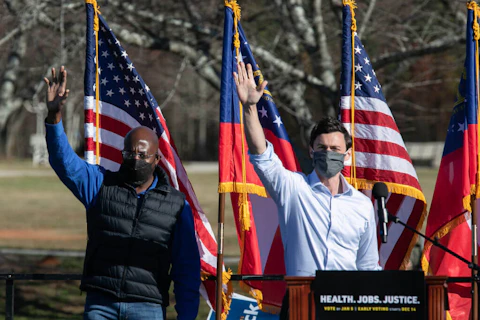“When I walked in there I was taking the spirit of the civil rights movement with me,” said Desmond Meade. After 30 years, Meade regained his right to vote and led the Florida Rights Restoration Coalition to help others vote too.
This article is part of COURIER’s Your Vote 2020 hub. For more stories from each of the battleground states, along with national reporting, visit the site here.
In August, Desmond Meade got to vote for the first time in 30 years. And when he stepped into that voting booth during Florida’s primary election, he wasn’t casting his ballot alone.
“When I walked in there, I was taking the spirit of the civil rights movement with me,” Meade said in an interview with COURIER less than a week after casting his vote. “And the ancestors who, you know, went through so much for people like me to have an opportunity to vote. Whether they were hung, whether they were burned, bitten by dogs, sprayed with fire hoses. They went through a lot.”
Meade brought his own family with him for the occasion as well, saying he was inspired by entire families going to vote during the civil rights era.
“I kind of channeled that spirit,” he said. “I really felt honored and stood in reverence of all that was done before me to lead to that moment.”
RELATED: I’m a First-Time Voter. Here’s Why More Youth Like Me Will Come Out to Reject Trumpism.
What it took to get Meade to that moment wasn’t just the civil rights movement. And the typical barriers that have been enacted across the country to keep Black people from voting stood in the way as well. However, Meade had an extra hurdle to clear in Florida: With felony convictions in his past, that meant he couldn’t vote again.
That changed in 2018, when Meade—who earned a law degree after finishing his sentence—organized. He led the Florida Rights Restoration Coalition (FRRC) as its president, seeking to restore voting rights to 1.5 million people with felony convictions in the state with a ballot initiative that put the question to the people of Florida.
The amendment passed overwhelmingly, with 65% of Floridian voters—over 5 million people—agreeing that those who have completed their sentences should be given the right to vote again.
Despite massive public support for the amendment in the state, Florida Republicans passed a law in 2019 that sought to inhibit those rights from being fully restored. The law is essentially a poll tax. It requires people with felony convictions to pay any outstanding fines and court fees associated with their sentences.
And for Meade, that meant his first time voting in 30 years was also tinged with sadness.
“With that great feeling came the fact that there were over 700,000 people in Florida—returning citizens—who are not going to have the opportunity to experience what I was experiencing at that moment,” Meade said. “At the end of the day, we’re still fighting with our Fines and Fees Fund to make sure that they will have the opportunity to vote in the general election.” The fund helps to cover fees that people with felony convictions might have, and has earned support from celebrities and athletes like Michael Jordan and Lebron James.
As an added twist to Meade’s first vote in over 30 years, that day, Florida lawyers would argue in federal court that their “fines and fees” law was constitutional.
“As I was voting for the first time over 30 years, hours later on that same day, the state of Florida was going to be presenting oral arguments in the 11th Circuit as to why people like me shouldn’t vote,” Meade told COURIER. “Which is kind of frustrating, especially believing in a perfect democracy that a state would be doing all that it can to create a more inclusive democracy.”
That case is expected to head to the Supreme Court. Meanwhile, the state has spent $1.7 million in legal fees to fight returning citizen’s right to vote, contrary to their own argument about the fiscal necessity of collecting often small court fees from those completing their sentences.
But Meade wasn’t deterred: “It did not overpower the joy that I felt to be able to say that I could finally complete sentencing and my voice did count.”
RELATED: ‘It Made Me Feel Really Powerful’: What Voting for the First Time Was Like for These Women
He also pointed out that his voice was needed in Florida’s primary election, when local offices with power over police and prison systems—like district attorneys and sheriffs—are elected.
“Those were the main races I voted on and those are the races that are so vital to our community,” Meade said. “And especially when you talk about me—who has been through the system—it takes on even greater importance. I have a more personal understanding of the power of these offices and how they can impact our communities. And so to be able to lend my voice to that discussion, to lend my voice to the process, was very special considering the candidates on the ballot.”
Ahead of November’s general election, Meade says FRRC has helped register over 100,000 returning citizens to vote, and their goal is to register another 100,000 before the election. Numbers like that could make a difference in a presidential contest. Former Sen. Hillary Clinton (D-N.Y.) lost Florida by just over 100,000 votes in 2016.
In November, Meade already knows how he is going to vote in his first presidential election: in person.
“As a person who has never had that experience, I want that experience. I’m going to be PPE’d down, I’m going to have my mask, my sanitizer,” Meade said with a laugh. “I encourage people to use the mail. They can vote by mail. But me, personally? I’ve got to have that experience. I’m going in to cast that ballot in person.”




